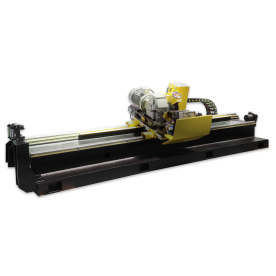[Precision Tube making equipment]Exploring the Innovations and Applications of Precision Tube Making Equipment in Modern Manufacturing Processes
News 2024-9-3
In the high-stakes world of manufacturing, precision is not just a bonus; it's a necessity. As industries evolve, so do the methods and technologies used in production. One of the most critical components in this evolution is precision tube making equipment, which has become indispensable across various sectors, including automotive, aerospace, medical, and construction. The following article delves into the complexities and advancements in precision tube making equipment, examining its significance, operational mechanisms, and its multifaceted applications.
Understanding Precision Tube Making Equipment

Exploring the Innovations and Applications of Precision Tube Making Equipment in Modern Manufacturing Processes

Exploring the Innovations and Applications of Precision Tube Making Equipment in Modern Manufacturing Processes
Key Technologies in Precision Tube Making
1. **CNC Technology**: Computer Numerical Control (CNC) technology has revolutionized precision tube making by automating various manufacturing processes. CNC machines can execute complex tube shapes and designs with high precision, reducing the margin for human error. This automation not only speeds up production but also enhances repeatability, ensuring that each tube produced meets the exact specifications required.
2. **Laser Cutting and Welding**: Laser technology has significantly impacted tube manufacturing, particularly in cutting and welding processes. Laser cutting provides accurate, clean edges with minimal thermal distortion, which is essential for precision tube applications. Similarly, laser welding allows for fast, strong joints that can withstand plenty of stress and pressure, crucial for industries like aerospace and automotive where safety is paramount.
3. **Forming and Bending Equipment**: Advanced forming and bending machines are now capable of producing intricate shapes and designs. These machines utilize hydraulic or mechanical methods to bend tubes without compromising their structural integrity. Advanced bending technologies, such as rotary draw bending and roll bending, allow manufacturers to create complex geometries while maintaining precise dimensions.
Applications of Precision Tube Making Equipment
The applications of precision tube making equipment stretch across a wide range of industries, reflecting its versatility and importance.
1. **Automotive Industry**: In automotive manufacturing, precision tubes are essential for constructing exhaust systems, fuel lines, and suspension components. The reliability of these tubes is critical, as they must withstand varying temperatures and pressures while maintaining structural integrity. As electric vehicles gain popularity, precision tubes are also used in battery cooling systems and structural components.
2. **Aerospace Industry**: The aerospace sector demands tubes that can withstand extreme conditions, including high temperatures and pressures. Precision tube making equipment ensures that components used in aircraft and spacecraft meet stringent safety and performance standards. For example, tubes used in fuel systems, hydraulic systems, and airframe components are all manufactured with unparalleled precision.
3. **Medical Industry**: In the medical field, precision tubes are crucial for various applications, including surgical instruments, catheters, and diagnostic devices. These tubes must be manufactured to exacting standards to ensure patient safety and device efficacy. Furthermore, advancements in materials and manufacturing techniques allow for the production of thinner, more flexible tubes, which can be critical in delicate medical applications.
4. **Construction and Architecture**: Steel and aluminum tubes manufactured using precision tube making equipment are increasingly used in construction and architecture. These materials provide structural integrity and aesthetic appeal in various applications from scaffolding to decorative elements in building designs.
Conclusion

